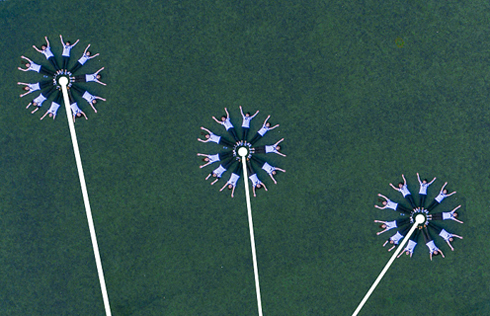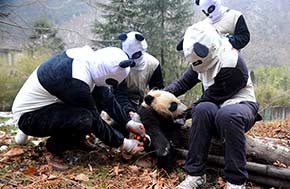Dalai Lama's hometown faces urbanization
HONG'AI VILLAGE, Qinghai - The 14th Dalai Lama's birthplace, an obscure, out-of-the-way village in the mountains of Northwest China's Qinghai province, is now facing the dilemma of urbanization and an urge to maintain its traditions.
The village of Hong'ai, formerly known as Taktser, is located in Ping'an county in Haidong prefecture.
According to a provincial government plan, the prefecture will soon become a city to be named Haidong and its former capital of Ping'an will be one of its districts.
The plan has been endorsed by the State Council, China's cabinet, but the provincial government has yet to announce an exact timetable.
Starting from this year, the provincial treasury will allocate 1.5 billion yuan ($244 million) annually to boost Haidong's infrastructure construction, the provincial government said Friday.
Among the new city's key construction projects are the renovation of old roads and residential areas, as well as the construction of new homes, urban boulevards, commercial centers, a sewage treatment plant and drinking water facilities.
The new Ping'an district is also home to a high-tech industrial base that features companies operating in the new energy, new materials and information technology sectors.
The Zhongguancun High-Tech Industrial Base, which was named after an area of Beijing widely known as China's "Silicon Valley," has drawn 12 high-tech companies from China, the United States and Japan since it opened last year.
"The base is essential in accelerating infrastructure construction in Ping'an county," said Ma Yingjian, a deputy official from the base's administration.
Haidong, located in east Qinghai, is an underdeveloped, predominantly agricultural area. Even its capital of Ping'an lacked decent roads, water facilities and electricity until the last two decades.
"China began boosting development in western regions starting in the late 1990s," said Sun Xiuzong, deputy chief of Ping'an county. "Today, the once bleak, underdeveloped county is closer to a boom town, with blacktop roads, tap water, electricity and telecommunication infrastructure."
Last year, Haidong's GDP totaled 27.4 billion yuan, nearly 27 times the 1978 figure. The per capita annual income of local residents averaged 5,352 yuan, 35 times the 1978 standard.
Looming changes
"It's good to live in a city, where children can attend better schools and we can enjoy better medical services," said Gonpo Tashi, a nephew of the 14th Dalai Lama, who fled to India in 1959. "But my special mission has kept me here in the village."
Formerly a primary school teacher and later vice chairman of the local political advisory body, Gonpo Tashi has retired and devoted himself to his "special mission": taking care of the old residence where the Tibetan spiritual leader was born and spent his first years.
Gonpo Tashi is the Dalai Lama's only relative in China. His desire to protect his uncle's old residence was realized in October with a 2.5-million-yuan allocation from the central treasury.
The refurbished compound has retained its original look, but the ground is newly paved, beams have been reinforced and murals were repainted.
The prayer hall contains statues of Sakyamuni, Kwan-yin and the 14th Dalai Lama. The hall is open to Tibetan Buddhists for worship purposes. In addition to locals, pilgrims travel from other Tibetan communities in the neighboring Gansu province and Tibet autonomous region.
Local villagers got wind of the urbanization plan two years ago, with 20 of the 64 families living in Hong'ai purchasing new homes in the county seat, said Qi Liankui, a village official.
"In Hong'ai, the altitude is 2,800 meters. In Ping'an county, however, it is a more comfortable 2,200 meters," said Gonpo Tashi.
His neighbor Tsepal is also looking forward to urban life. Tsepal and her husband grow grain and vegetables to feed their family. Their grown-up son works in the provincial capital of Xining.
"When Ping'an county evolves into a boom town, there'll be more job opportunities close to our home. That will save my son's travel costs and our family will be together more often," said Tsepal.
But like many villagers, she is not sure about the drastic changes that new life might bring to their ancestral land.
Urbanization might affect the income her family receives from trading caterpillar fungus. The family makes up to 20,000 yuan a year trading the fungus.
Digging and selling the fungus, a rare plant native to the Qinghai-Tibet Plateau, is a lucrative trade in Ping'an. But urbanization and industrialization might cause the fungus to disappear altogether in many areas.
On the other hand, Ping'an is not the planned political center of the city of Haidong, according to the government's urbanization plan. The new city center will be in Ledu.
"That might hinder Ping'an's economic development," said Gonpo Tashi. "We have heard that housing prices in the county seat have dropped by 1,000 yuan per square meter since the beginning of this year."
But Sun Faping, a researcher with the provincial academy of social sciences, said urbanization will be crucial in boosting overall growth in China's rural areas, particularly in Tibetan communities.
"The move will bring better schools and hospitals, as well as provide better social security and other public services for local people," said Sun. "It'll be an effective way to narrow the gap between developed and underdeveloped regions."
He Feng, a Tibetan studies specialist at the Qinghai University for Nationalities, called for better preservation of traditional culture during the urbanization drive.
"That'll be important in maintaining cultural diversity and social harmony between the Tibetans and people of other ethnic groups," he said.

























